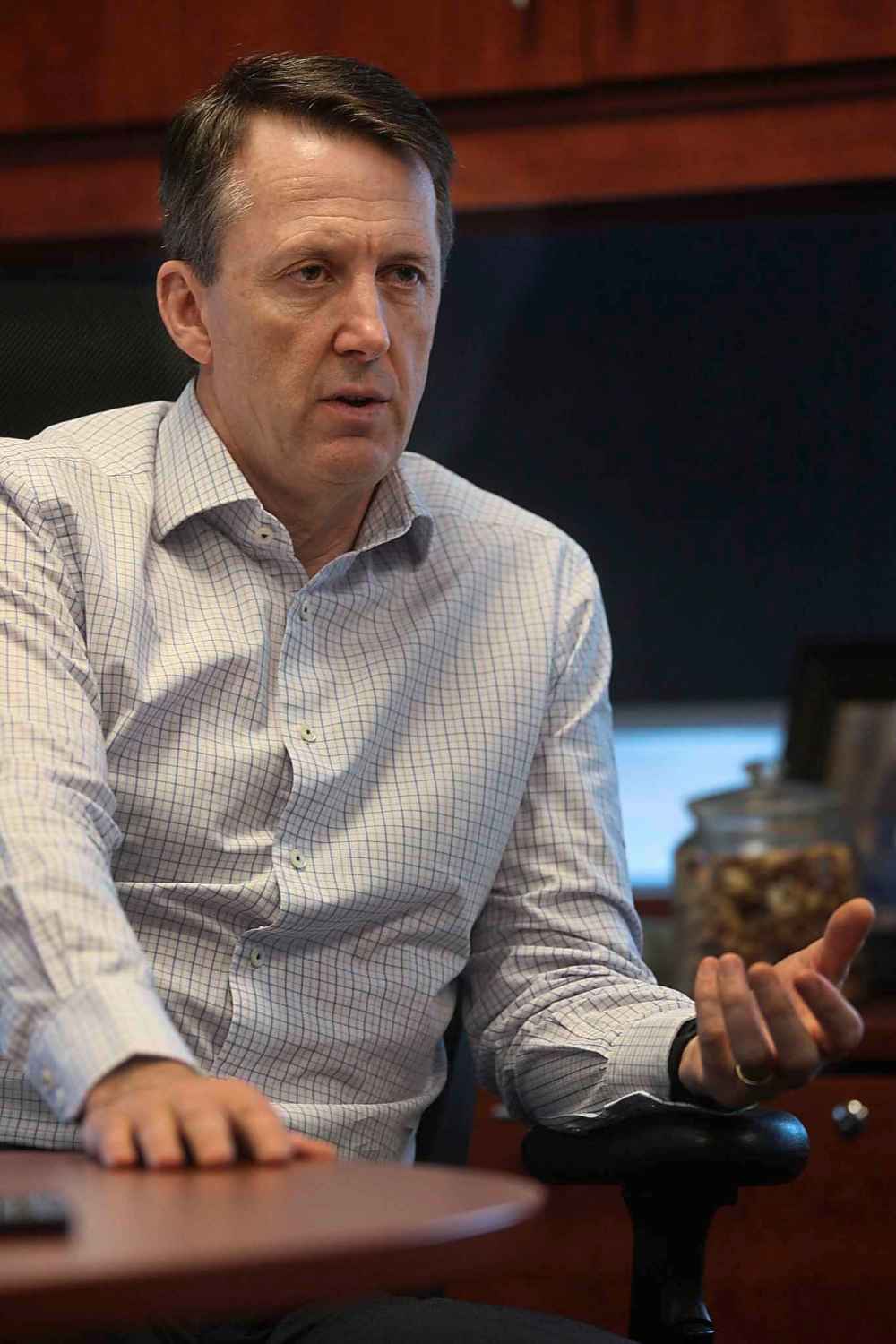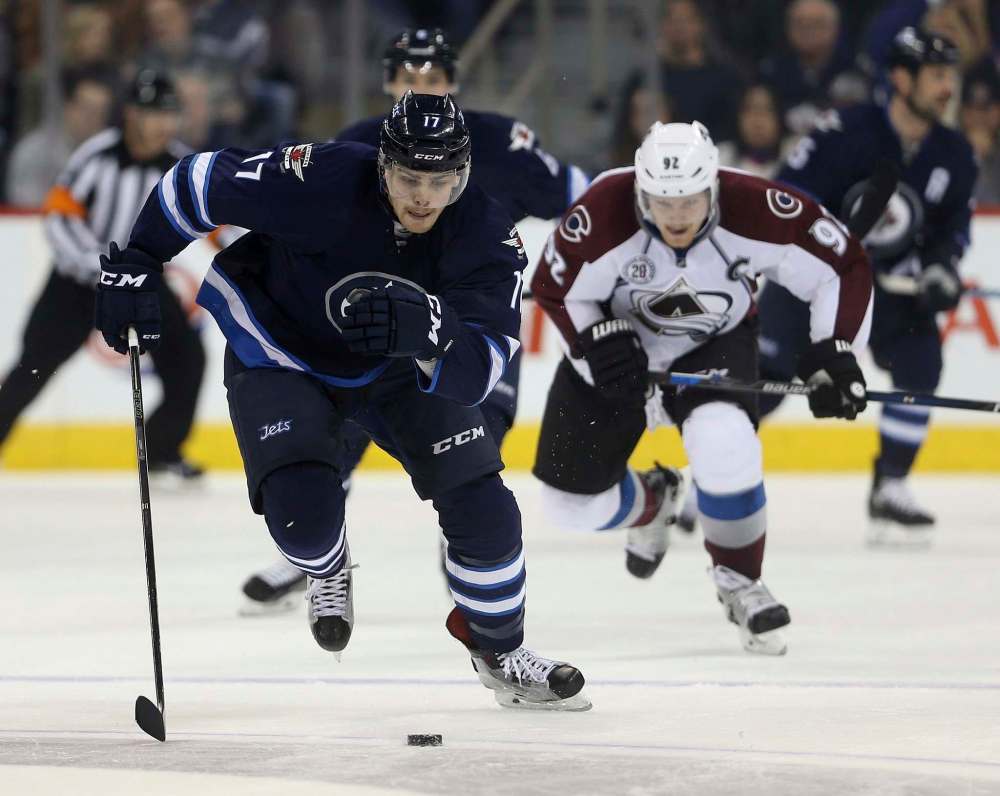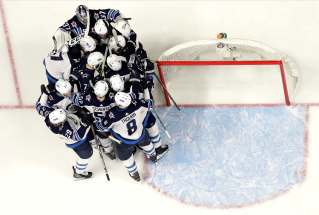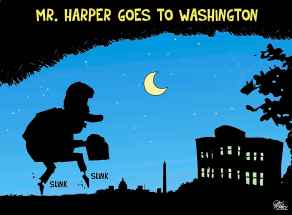For some Jets warriors, season’s brothers-in-arms valour turns to summer’s mercenary value
Read this article for free:
or
Already have an account? Log in here »
To continue reading, please subscribe:
Monthly Digital Subscription
$0 for the first 4 weeks*
- Enjoy unlimited reading on winnipegfreepress.com
- Read the E-Edition, our digital replica newspaper
- Access News Break, our award-winning app
- Play interactive puzzles
*No charge for 4 weeks then price increases to the regular rate of $19.00 plus GST every four weeks. Offer available to new and qualified returning subscribers only. Cancel any time.
Monthly Digital Subscription
$4.75/week*
- Enjoy unlimited reading on winnipegfreepress.com
- Read the E-Edition, our digital replica newspaper
- Access News Break, our award-winning app
- Play interactive puzzles
*Billed as $19 plus GST every four weeks. Cancel any time.
To continue reading, please subscribe:
Add Free Press access to your Brandon Sun subscription for only an additional
$1 for the first 4 weeks*
*Your next subscription payment will increase by $1.00 and you will be charged $16.99 plus GST for four weeks. After four weeks, your payment will increase to $23.99 plus GST every four weeks.
Read unlimited articles for free today:
or
Already have an account? Log in here »
Hey there, time traveller!
This article was published 06/07/2018 (2718 days ago), so information in it may no longer be current.
Let’s go for a walk:
It’s January 2016 and Winnipeg Jets co-owner Mark Chipman is doing a Q&A session at the annual Manitoba Sportswriters and Sportscasters dinner.
Chipman gets to talking about the brass-knuckle business that is pro hockey. “It’s a beautiful game and that’s the best part of it. But the business of professional hockey is challenging, it’s tough,” Chipman tells the crowd.

“For example, we have a great relationship with our players. We really do. And I think in our group, we have a particularly great group of young men. What’s frustrating about it is you build these relationships and then it ultimately comes towards the end of a contract.
“And when it comes towards the end, you feel the investment both sides made in the relationship gets difficult because it’s so often about money. And you’re not really dealing with the person with whom you built the relationship — you’re dealing with the person who represents them. And that’s tricky some days…
“There isn’t that real level of trust you wish existed. I think those are things that could improve, and will improve. But it’s just going to continue to take time.”
The backdrop to Chipman’s comments that night were contentious contract extension talks that were ongoing at the time between the Jets and both defenceman Dustin Byfuglien and then-captain Andrew Ladd.
The Byfuglien extension got done and Ladd was traded.
I wrote about Chipman’s comments at that time because it was an unusually rare — and unusually frank — glimpse into the harsh realities of owning a team in the NHL from a famously private man.
And I’m writing about those comments again because they are even more relevant today in a week the Jets led the NHL in players filing for salary arbitration.

A total of 44 players filed for salary arbitration by the league deadline Thursday afternoon, and five of them — Jacob Trouba, Connor Hellebuyck, Adam Lowry, Brandon Tanev and Marko Dano — came from the Jets.
Calgary was the only other team that had as many players file.
And so with that, the dream that was the 2017-18 season has now run head first into the harsh reality that all those same Jets players who gave so selflessly to the team just a few months ago are now going to just as selfishly attempt to extract every last possible dime from that same team.
They are all in it together — until they’re not. And that time has now arrived.
Gimme.
It is the reality of the era in which we live, a time when pro sports is about high finance at least as much as it’s about athletic achievement.
A player’s loyalty today is bought and sold which, of course, isn’t really loyalty at all.

And it’s worth remembering that harsh reality the next time you see a player in mid-season telling the media, a tear rolling down one cheek for effect, that, “I’d do anything for the guys in this room, man.”
Anything, that is, until it comes time to negotiate a new contract. And then it’s every man for himself.
You’d be better off being a rat on a sinking ship.
Now, the Jets are a profitable local industry owned by a rich man (Chipman) and an insanely rich man (Toronto billionaire David Thomson). And so as a general principle, it’s hard to feel much sympathy that these two guys might have to cash in some Krugerrands to get a deal done with some of the players who helped the franchise more than double in value, according to Forbes magazine, since Chipman and Thomson bought the franchise in 2011.
As a lifelong union man, I am generally in favour of comforting the afflicted (me) and afflicting the comfortable (ownership).
But the NHL has skewed the rules of supply (the players) and demand (the owners) with a salary cap, the existence of which now means that every extra dime Lowry extracts from Chipman and Thomson in the coming weeks is going to be one less dime they will have available to re-sign Trouba or Hellebuyck or Tanev.
Or, for that matter, one less dime to extend captain Blake Wheeler and sniper Patrik Laine, both of whom will be without contracts at the end of next season and are players the Jets would like to lock up sooner rather than later.

And then there’s restricted free agent Josh Morrissey, who isn’t eligible for arbitration yet but is also now without a contract and also due a monster raise.
None of this stuff used to matter to the Jets, of course, because until now the team was a budget operation with one of the lowest payrolls in the NHL and all kinds of salary-cap room.
But success — at the draft table and on the ice — doesn’t come cheap, and if the Jets are going to get this talented band back together for another tour, they are going to need every last dime of their cap space to keep all these guys in the fold.
All of which is to say it would have been nice if everyone could have worked together co-operatively this summer to get deals done that would have allowed a group of young men to get fabulously rich while the franchise continues to prosper, on the ice and off.
Of course, it would also be nice if Empress Street in front of Home Depot didn’t resemble Saigon in ’73, but that’s not going to be changing any time soon, either.
After pulling together all season long, Trouba, Hellebuyck, Lowry, Tanev and Dano are now at cross-purposes, both with their club and with each other.
Now, some of this might still work itself out. The history of NHL salary arbitration suggests it’s a lot more about posturing than brinkmanship. Last summer, for instance, only one player of the 30 who filed for arbitration had his salary determined by an arbitrator; the others all managed to work out deals before their hearing dates.

So, a lot of this should — and likely will — get ironed out in-house. But just don’t expect any of the guys who filed for arbitration this week to “take one for the team.”
Trouba, for one, has a long track record of doing what’s right for Trouba, even when it’s been what’s wrong for Trouba.
And Hellebuyck, for another, is almost certainly going to make Jets GM Kevin Cheveldayoff pay dearly for giving big bucks to Steve Mason last summer instead of locking this year’s Vezina Trophy finalist down when he had the chance.
Lowry and Tanev will get paid, too.
And if you think any of these guys is going to take less than every cent of what they can get just to help the Jets stay under the cap and keep this team together, you’re still living in a world when sports stars such as Ken Ploen lived here all year long and had part-time jobs in the off-season.
Things have changed. These days, it’s every man for himself when it comes to contract time. And if that means the team — or that guy in the next locker stall — gets screwed? The NHL and it’s players would prefer you didn’t notice that.
The billion-dollar hockey business doesn’t operate without its myths. And the one suggesting that any of these guys ultimately cares about anyone but themselves tops that list.

Chipman had it right that night a couple of years ago: hockey is a beautiful game and a very lousy business.
paul.wiecek@freepress.mb.ca
Twitter: @PaulWiecek

Paul Wiecek
Reporter (retired)
Paul Wiecek was born and raised in Winnipeg’s North End and delivered the Free Press -- 53 papers, Machray Avenue, between Main and Salter Streets -- long before he was first hired as a Free Press reporter in 1989.
Our newsroom depends on a growing audience of readers to power our journalism. If you are not a paid reader, please consider becoming a subscriber.
Our newsroom depends on its audience of readers to power our journalism. Thank you for your support.










